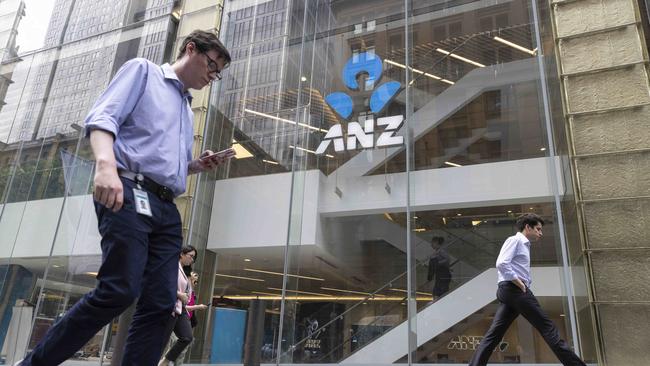ACCC to increase probe into ANZ’s $4.9bn tilt for Suncorp Bank
The competition regulator will use compulsory powers to tap banks for reams of detailed information so that it can assess how ANZ’s $4.9bn play for Suncorp Bank will impact the sector.
The competition regulator is using its compulsory powers to tap banks for reams of detailed information about industry pricing, marketing, technology and customer switching as it assesses ANZ’s tilt for Suncorp Bank.
Sources told The Australian major and regional banks were issued section 155 notices under the Competition and Consumer Act 2010 relating to the regulator’s information gathering and assessment of the proposed deal.
The data and information being sought by the ACCC spans areas including details about bank returns, net interest margins, funding costs, market share, interest rates, customer switching practices, pricing, technology and product distribution.
The big four banks and regional players are compelled under the notices to provide the ACCC with the detailed data and information so that it can make a more thorough assessment of how the proposed tie-up between ANZ and Suncorp’s bank may impact competition in the sector.
An ACCC spokeswoman declined to comment on Tuesday on the notices while a merger authorisation process was ongoing.
ANZ agreed to buy Brisbane-headquartered Suncorp Bank in a $4.9bn transaction announced in July. The deal requires the ACCC’s green light to ensure it won’t substantially reduce competition across various markets, as well as approval from the federal and Queensland governments. State-based legislation would need to be changed to facilitate the takeover of Suncorp’s bank.
The ACCC in December released ANZ’s merger authorisation application and asked for submissions on the proposed transaction from interested parties by January 18. The regulator has signalled it will make a determination in June.
The ACCC’s letter to interested parties last month said it was seeking feedback across areas including home loans and deposits, commercial banking and agribusiness products and credit cards. The regulator is also asking interested players and stakeholders for feedback relating to any specific competitive or public detriment they consider the deal will cause.
ANZ argued in its application that the banking sector has “numerous competitors and new entrants” and that the combination of it and Suncorp’s bank won’t “materially alter” its market share or significantly increase concentration in any market.
But ANZ admitted it may bring forward some cost-cutting initiatives, not including its commitment to no net job losses at Suncorp Bank in Queensland and not closing the target’s branches in the state for three years. ANZ has made no such commitment to retaining its own branches and Queensland employees.
ANZ’s proposed deal follows a spate of takeovers in the sector in the past two years that saw National Australia Bank buy digital player 86 400 and Citibank’s local retail operations, while Bank of Queensland acquired ME. Bendigo and Adelaide Bank snapped up digital player Up, in a deal announced in August 2021.
ANZ’s application to the ACCC argued that it is the smallest of the major banks and the acquisition of Suncorp’s unit would allow it to grow in Queensland where the bank has lighter representation.
The heavily redacted application said the combination of ANZ and Suncorp Bank’s market share in home loans would be 15.41 per cent, which lags Commonwealth Bank at 25.8 per cent and Westpac at 21.54 per cent. ANZ said it would end up slightly ahead of NAB, which has share of 14.89 per cent.

ANZ noted entrants such as Judo and incumbents like Macquarie Bank were winning share in some parts of the market.
ANZ and Suncorp’s combined market shares were, however, redacted for a range of markets including commercial lending and agribusiness.
If the transaction is waved through by the ACCC and federal and state governments it would leave Suncorp as a pure general insurer in the domestic market. The Australian last month revealed Steve Johnston-led Suncorp had Boston Consulting Group conducting work delving into how the company should be structured as just an insurance player, if a deal to offload its bank got the go ahead.
BCG was said to be assisting Suncorp to work out the best structure for the group without its bank, removing duplication and dealing with a string of issues such as stranded costs that would stem from the transaction. A witness statement lodged by Mr Johnston with the ACCC – late in 2022 – shed more light on Suncorp’s thinking and the board’s knocking back of overtures by Bendigo and Adelaide Bank. The regional player had expressed interest in buying Suncorp’s bank.
Last month, Bendigo Bank’s managing director Marnie Baker took a swipe at ANZ’s takeover of Suncorp’s bank, saying it would impede competition in the market. “If successful, this acquisition will concentrate market share and hand a commanding position in the Queensland market to a big four bank. It will further entrench Australia’s banking oligopoly which invariably leads to sub-optimal outcomes for customers and communities,” she said.
If the ACCC or the Albanese government were to knock back the ANZ-Suncorp bank transaction, appeals would likely be forthcoming to the Australian Competition Tribunal or the Federal Court.
Separately, ANZ on Tuesday told investors its non-operating holding company structure was being implemented. That means the non-operating holding entity is the listed parent company of ANZ and eligible shareholders have received one share in the new entity for every share in the listed bank they held. Ineligible foreign shareholders – accounting for just more than 1.8 million ANZ shares – will receive cash for their holdings.
The structural overhaul sees ANZ separate its banking and non-banking businesses.




To join the conversation, please log in. Don't have an account? Register
Join the conversation, you are commenting as Logout